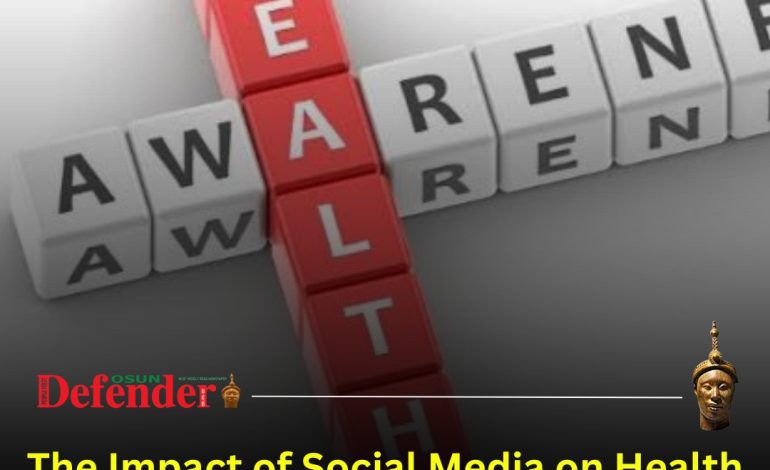The Impact Of Social Media On Health Awareness In Nigeria

In recent years, social media has emerged as a powerful tool for communication, transcending geographical boundaries and connecting people worldwide. In Nigeria, where internet penetration is rapidly increasing, social media platforms such as Facebook, Twitter, Instagram, and WhatsApp have become vital channels for raising health awareness. While this trend has brought numerous benefits, it also presents challenges that must be addressed to maximize its potential for public health.
A Growing Platform for Health Education
Social media platforms in Nigeria have become critical avenues for disseminating health information. Organizations, healthcare professionals, and influencers use these platforms to share knowledge about preventive healthcare, vaccination campaigns, mental health awareness, and disease outbreaks. During the COVID-19 pandemic, for example, platforms like Twitter and Facebook played a crucial role in educating the public about safety measures, symptoms, and vaccination protocols.
Additionally, social media has enabled real-time interaction between healthcare providers and the public. Questions about health concerns can now be answered promptly, and individuals are increasingly turning to these platforms for medical advice and community support.
Increased Accessibility and Outreach
With over 130 million internet users in Nigeria as of 2024, social media offers unparalleled reach. It has become a lifeline for health education in rural and underserved areas, where traditional health campaigns may struggle to penetrate. Smartphone affordability and data accessibility have further contributed to this phenomenon, allowing users from diverse socio-economic backgrounds to access valuable health information.
READ ALSO:
- The Role of Social Media Influencers in Shaping Nigerian Lifestyles
- Social Media And Nigerian Entertainment
Challenges and Misinformation
Despite its advantages, the use of social media for health awareness in Nigeria is not without challenges. Misinformation and fake news are significant concerns. Unverified health tips, rumors, and conspiracy theories often spread rapidly, leading to confusion and, in some cases, harmful practices. For instance, false information about vaccines has fueled skepticism and hesitancy among certain populations.
Moreover, the lack of regulation on social media platforms makes it difficult to control the spread of such misinformation. While platforms have introduced measures to combat fake news, these efforts are not always effective in curbing the spread of health-related myths.
The Role of Influencers and Organizations
Health influencers, non-governmental organizations (NGOs), and government agencies have recognized the power of social media to drive positive change. Campaigns promoting awareness about conditions such as HIV/AIDS, malaria, and mental health have gained traction, leveraging hashtags and viral content to engage the public. The #EndMalaria campaign and mental health awareness initiatives by Nigerian organizations are prime examples of how social media can be used to address critical health issues.
Recommendations for Improvement
To harness the full potential of social media for health awareness in Nigeria, stakeholders must take concerted steps:
1. Strengthen Digital Literacy: Educating the public on identifying credible sources of information can reduce the impact of misinformation.
2. Collaborate with Influencers: Partnering with trusted influencers can help amplify accurate health messages.
3. Regulate Content: Implementing policies to monitor and flag false health information on social media platforms is crucial.
4. Leverage Local Languages: Providing health information in local languages can enhance understanding and accessibility for a broader audience.
Conclusion
Social media has revolutionized health awareness in Nigeria, offering a platform for education, outreach, and engagement. However, the challenges of misinformation and lack of regulation must be addressed to ensure its impact is positive and far-reaching. With strategic use and collaboration among stakeholders, social media can continue to play a transformative role in improving public health across the nation.

Titilope Adako is a talented and intrepid journalist, dedicated to shedding light on the untold stories of Osun State and Nigeria. Through incisive reporting, she tackles a broad spectrum of topics, from politics and social justice to culture and entertainment, with a commitment to accuracy, empathy, and inspiring positive change.









